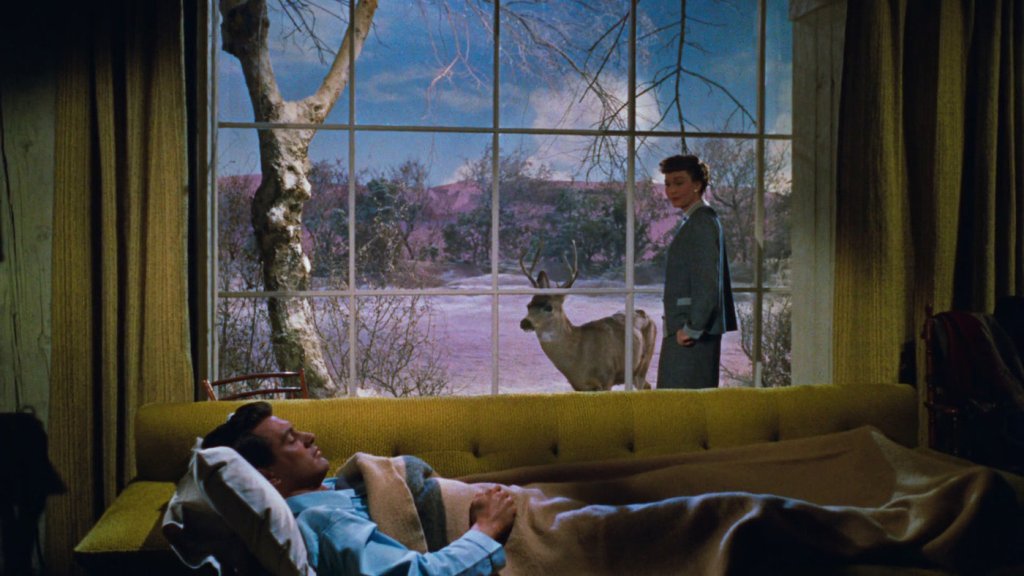As a visual medium, cinema has its own pathways for an audience to recognize the tragedy of a society forbidding the love between people. A film’s script can make the tragedy explicit through the dialogue of approving or disapproving characters, but the visual nature of a film opens multiple opportunities for the couple to communicate their longing wordlessly with glances, stares, gaits and rhythms.
As an homage to Douglas Sirk’s All That Heaven Allows, Fassbinder’s Ali: Fear Eats the Soul is a careful deconstruction of the visual fantasies that make cinematic melodramas appealing, particularly in Hollywood. But Fear Eats the Soul is not just a deconstruction of tropes; it is a beautiful story that still, despite the film’s artificial alienating effects, brings the audience to hating the reasons why two people are kept apart.
To appreciate what Fassbinder is doing with this film, let us look at a few examples of his deconstructing techniques. Each subtitle in quotes is the expression of an intention to heighten the melodramatic form with visual style.
“The attractions of beautiful people cannot be broken by social structure.”
The low hanging fruit of film casting is to cast likeable characters with beautiful people. In the tragedy of forbidden love, the physical beauty of the couple can make the disapproval of others feel absurd: as the townspeople frown in disgust at the idea of someone falling in love with someone outside their class, race, religion, or sexual orientation, the object of their dislike is played by an actor that can or does model on the side, when they are not cast in leading film roles. This absurdity is built in the foundation of Sirk’s All That Heaven Allows. Are the children in the story really this dumbfounded that their widowed mother could be attracted to Rock Hudson?
To play with our expectations about the mutual attractions of beautiful people on screen, Fassbinder creates a couple that, visually, would be rejected by every Hollywood casting director. It is not a question of whether Emmi Kurowski, played by Brigette Mira, is ugly. Rather, Fassbinder is preventing the camera from finding glimpses of Mira’s beauty. All the audience sees is an old woman who is well past her sexual prime. Consequently, there is no opportunity for physical attractions to transcend social structure. The restriction is set from the beginning of the film; for everyone in on the joke at the bar, it is funny that a young and handsome Ali, played by El Hedi ben Salem, approaches Emmi and asks her to dance.
“The lovers stare at each other and the disapproving crowd looks away in disgust.”
The stare is one of cinema’s most powerful images. So much storytelling can be done with it. To film the stares of characters in love, the director has to make a number of decisions that include the visual geometry of faces and bodies, and whether the camera is inside or outside of people’s viewpoints.
Fassbinder’s novelty in filming the stare is his acute understanding that, typically, the director of a melodrama is obsessed with the blocking of the couple; it is their secret or forbidden desires which make them stare at each other — from across a room, a dinner table, or through windows. In Fear Eats the Soul there is a near perfect inversion of this attention. Ali and Kurowski stare at one another, but the disapproving masses stare, and stare, and keep staring. For instance, in a key scene we see waiters and cooks of a cafe standing several tables away from Ali and Emmi, who sit alone in the cafe’s garden patio. The staff stand motionless together and stare directly at the couple. Breaking down in frustration from the accumulation of these sorts of judgmental looks, Emmi yells at the staff to stop staring. Not a single person flinches or looks away.
“The relationship is the sanctuary of the lovers.”
Fassbinder does not want the xenophobic hate for Ali to just be an implicit subtext of Fear Eats the Soul. Instead, various characters make it known to Emmi and Ali that their love is an unequivocally bad symptom of post-war Germany. As plot in a melodrama, this xenophobia is what first makes the intimate relationship between Emmi and Ali a sanctuary from the negativity and loneliness that surround their lives. Emmi, in her stronger moments, is neither ashamed of Ali nor does she supplicate to the family, neighbors and co-workers that ostracize her.
In All That Heaven Allows, Rock Hudson’s home is the effective sanctuary for the lovers. Importantly, this home is outside of town, so the scenic isolation adds geographic protection against the judgments of others. Fassbinder gives his couple considerably less protection against other people. He also prevents the intimate barrier of the relationship between Emmi and Ali from having a perfect seal. In one scene, for example, Emmi is excited to take Ali to dine at a restaurant she believes to have been frequented by Hitler. In other scenes, Emmi is approving of how her German neighbors, after needing Ali’s strength to help move furniture, gawk at his muscles and compliment his ability to be as clean as German men. Emmi also seems to have zero interest in learning to make couscous, Ali’s desired dish of Morocco and what keeps making him visit the woman who owns the bar.
The emotional power of Ali: Fear Eats the Soul comes from Fassbinder’s decision to amplify the pressure that society is putting on the relationship between Emmi and Ali. Amongst the waves of social pressure to dissolve this relationship, Emmi and Ali refuse to let go of each other. Moreover, the couple affirms rather than ignores their imperfect match. Emmi understands that Ali will need other women for sex (and Moroccan food), and Ali shows Emmi no resentment for their age difference.
But the waves of social pressure will continue. In the penultimate scene, Ali collapses to the ground. The final scene reveals the cause is an ulcer, which is diagnosed by a hospital doctor that nonchalantly complains how this is a common illness for Germany’s foreign workers, even the ones as young as Ali. Ali is unconscious in a hospital bed and it appears Emmi will stay by his side.


